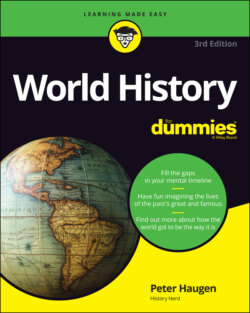Читать книгу World History For Dummies - Peter Haugen - Страница 94
Building Empires around the World
ОглавлениеAfter Alexander the Great died of a sudden fever in 323 BC, his vast empire disintegrated. Without Alexander, there was little to unite such widespread, dissimilar places as Macedonia, northern India, and Egypt — all among his territories. Yet the breakup brought about new empires — not as big, but impressive nonetheless. Several of them were founded by Alexander’s former military governors.
Alexander was primarily a conqueror. He couldn’t personally rule all the lands he won — especially not while conducting further military campaigns — so he appointed regional viceroys to govern in his name. The word viceroy is similar to vice president, with the “roy” part meaning king. These assistant kingships went to some of Alexander’s top military commanders.
With Alexander gone, the generals were free to turn their territories, which they had been holding in trust for their boss, into personal kingdoms. Ptolemy, Macedonian governor of conquered Egypt, used Alexander’s funeral procession to found his own Egyptian dynasty. Although the Roman Empire, the largest and most influential empire to emerge after Alexander, arose first as a city-state, and although the Mediterranean was sprinkled with successful Greek city-states, imperial might became the model for large-scale government in the late centuries of the BC period and the early centuries of the AD period.
